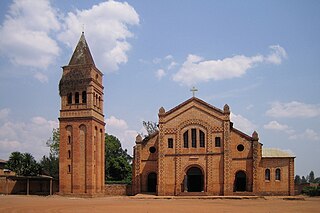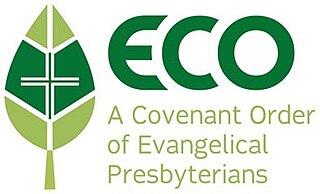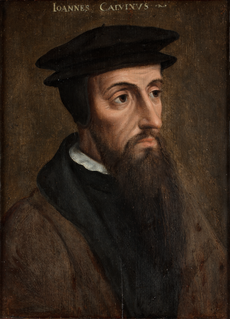Related Research Articles

Presbyterianism is a part of the Reformed tradition within Protestantism that traces its origin to the Church of Scotland.

The Presbyterian Church (USA), abbreviated PC(USA), is a mainline Protestant denomination in the United States. It is the largest Presbyterian denomination in the US, and known for its relatively progressive stance on doctrine and ordains women and LGBT community as elders and ministers. The PC(USA) was established by the 1983 merger of the Presbyterian Church in the United States, whose churches were located in the Southern and border states, with the United Presbyterian Church in the United States of America, whose congregations could be found in every state. The similarly named Presbyterian Church in America is a separate denomination whose congregations can also trace their history to the various schisms and mergers of Presbyterian churches in the United States. Unlike the PCA, the PC(USA) supports evangelical feminism and supports practise of same gender marriages. It also welcomes gay and lesbian persons to serve in leadership positions as ministers, deacons, elders, and trustees.
Presbyterianpolity is a method of church governance typified by the rule of assemblies of presbyters, or elders. Each local church is governed by a body of elected elders usually called the session or consistory, though other terms, such as church board, may apply. Groups of local churches are governed by a higher assembly of elders known as the presbytery or classis; presbyteries can be grouped into a synod, and presbyteries and synods nationwide often join together in a general assembly. Responsibility for conduct of church services is reserved to an ordained minister or pastor known as a teaching elder, or a minister of the word and sacrament.

The Presbyterian Church in America (PCA) is the second-largest Presbyterian church body, behind the Presbyterian Church (USA), and the largest conservative Calvinist denomination in the United States. The PCA is Calvinist in theology and presbyterian in government. It is characterized by a blend of Calvinist practice and broad evangelicalism.

The Presbyterian Church in the United States of America (PCUSA) was the first national Presbyterian denomination in the United States, existing from 1789 to 1958. In that year, the PCUSA merged with the United Presbyterian Church of North America, a denomination with roots in the Seceder and Covenanter traditions of Presbyterianism. The new church was named the United Presbyterian Church in the United States of America. It was a predecessor to the contemporary Presbyterian Church (USA).

The Reformed Church of France was the main Protestant denomination in France with a Calvinist orientation that could be traced back directly to John Calvin. In 2013, the Church merged with the Evangelical Lutheran Church in France to form the United Protestant Church of France.
The Anglican Church of Rwanda is a province of the Anglican Communion, covering 11 dioceses in Rwanda. The primate of the province is Laurent Mbanda, consecrated on 10 June 2018.

Christianity is the largest religion in Rwanda. The most recent national census from 2012 indicates that: 43.7% of Rwanda's population is Roman Catholic, 37.7% is Protestant, 11.8% is Seventh-day Adventist, 2.0% is Muslim, 2.5% claims no religious affiliation, and 0.7% is Jehovah's Witness.

The Reformed Presbyterian Church of North America (RPCNA) is a Presbyterian church with congregations and missions throughout the United States, Canada, Japan, and Chile. Its beliefs—formulated via membership in the Reformed Presbyterian Church and RP Global Alliance—place it in the conservative wing of the Reformed family of Protestant churches. Below the Bible—which is held as divinely inspired and without error—the church is committed to several "subordinate standards," together considered with its constitution: the Westminster Confession of Faith and Larger and Shorter Catechisms, along with its Testimony, Directory for Church Government, the Book of Discipline, and Directory for Worship.

The Presbyterian Church of Brazil is an Evangelical Protestant Christian denomination in Brazil. Oldest of the Reformed family of Protestantism in Brazil. It is the largest Presbyterian denomination in the country, having an estimate 649,510 members, 4,475 ordained ministers and 5,068 churches and parishes. It is also the only Presbyterian denomination in Brazil present in all 26 States and the Federal District. It was founded by the American missionary Rev. Ashbel Green Simonton, who also oversaw the formal organization of the first congregation and the first Presbytery. Although the Presbyterian Church of Rio de Janeiro was only formally organized in January 1863, and the Brazilian church only left the jurisdiction of the joint missions board of the American churches in 1888, when the Synod was formed, the denomination considers the date of Simonton's arrival in Brazil, August 12, 1859, as its foundation date.
Presbyterian Church of Pakistan is a major Protestant denomination of Pakistan. The Presbyterian Church of Pakistan has a membership of around 400,000 in 340 congregations served by 330 pastors. It was constituted in 1993. It belongs to the World Communion of Reformed Churches as well as to the World Council of Churches, among others. It has schools.
The Reformed Presbyterian Church of Equatorial Guinea is a minority church in Equatorial Guinea. It is reformed by its theology and presbyterian by its form of government, as stated in its constitution. The principal religion in Equatorial Guinea is Christianity, with approximately 85–93% of the population as followers. Most Christians belong to the Roman Catholic Church (80–87%) while a minority are Protestants (5–7%). Another 5% of the population follow indigenous beliefs, 2% are Muslims, followers of Baha'i and other beliefs.

ECO: A Covenant Order of Evangelical Presbyterians is an evangelical Presbyterian denomination in the United States. As a Presbyterian church, ECO adheres to Reformed theology and Presbyterian polity. It was established in 2012 by former congregations and members of the Presbyterian Church (USA), abbreviated PC(USA). Dissatisfaction with the declining membership of the PC(USA) along with growing denominational disputes over theology—particularly ordination of practicing homosexuals as pastors and gay marriage—and bureaucracy led to the founding of ECO. In 2018, ECO has over 383 congregations, 129,765 members and over 500 pastors. ECO churches are egalitarian in beliefs and ordains women as ministers, teaching elders and ruling elders.

The National Presbyterian Church in Mexico is the second-largest Protestant church, and the largest Reformed denomination in Mexico. It is present throughout the country, and is particularly strong in the states of Tabasco, Chiapas, Campeche, Yucatan, Nuevo León, Aguascalientes and Mexico City.
The Africa Evangelical Presbyterian Church (AEPC) is a growing conservative Presbyterian and Reformed Church which adheres to the Westminster Confession of Faith started in Kenya, later spread to the surrounding countries like Burundi, Tanzania, Congo and as far as Zimbabwe. The headquarters of the church is located in Nairobi, Kenya.
The Presbyterian Church in Cameroon (PCC) is a Reformed denomination in Cameroon and a member of the World Communion of Reformed Churches. It is the largest English-speaking church in Cameroon, founded by an American Presbyterian Mission. In addition to its religious activities it contributes to provision of health and education services in the country.

The Synod of Zambia is one of the five synods of the Church of Central Africa Presbyterian.

Presbyterianism has had a presence in the United States since colonial times and has exerted an important influence over broader American religion and culture.
The Kosin Presbyterian Church in Korea, also called Korea-pa, is an Evangelical Reformed and Presbyterian denomination in the Republic of South Korea. Although, congregations have spread all over North America and in many other countries.
References
- ↑ Koehrsen, Jens (2021-10-20). "Faith-Based Organizations in Development Discourses and Practice". London Metropolitan University. 1: 153 – via OAPEN.
- ↑ "Presbyterian Church in Rwanda".
- ↑ Koehrsen, Jens (2021-10-20). "Faith-Based Organizations in Development Discourses and Practice". London Metropolitan University. 1: 33–34 – via OpenLibrary.
- ↑ "Address data base of Reformed churches and institutions".
- ↑ www.eprwanda.org/spip.php?article68
- ↑ "Archived copy". Archived from the original on 2012-08-08. Retrieved 2012-08-08.CS1 maint: archived copy as title (link)